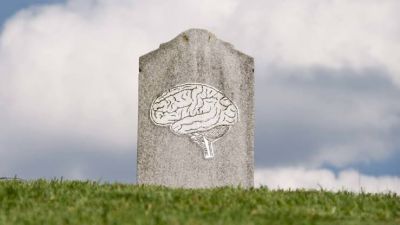How's this for a leadership exercise? I'd like you to think for a brief moment about the most important milestones in your life.
- Think of the friends and family you've loved, and the experiences you've had.
- Think of the people you've known, the key lessons you've learned, and the things you've built and grown.
- Think also of what you're not as proud of: the mistakes you've made and the choices you would have done differently if you had a second chance.
Now, imagine what it would be like to remember all of this, in a single flash of an instant, at the very same time.
It sounds like science fiction, or fantasy, or maybe a completely speculative idea. But a new article in Frontiers in Aging Neuroscience explores the possibility that it might be exactly what happens to your brain when you die.
In other words, a real-life application of the idea: "My life flashed before my eyes."
The article stems from a case in which doctors used electroencephalography to study the brainwaves of an 87-year-old epilepsy patient. Unfortunately, the patient suffered sudden cardiac arrest and died during the examination.
As tragic as that was, from a purely scientific perspective, it was a fortuitous accident, explained Dr. Ajmal Zemmar, a neuroscientist at of the University of Louisville who was one of the article's authors, because it meant that doctors compiled a detailed record of what the man's brain was doing for a 15-minute period around the time of his death.
"Just before and after the heart stopped working," Zemmar explained, "we saw changes in a specific band of neural oscillations, so-called gamma oscillations, but also in others such as delta, theta, alpha and beta oscillations."
These oscillations are associated with memory retrieval, which leads to the theory that, as Zemmar continued, "the brain may be playing a last recall of important life events just before we die, similar to the ones reported in near-death experiences."
Now, let's quickly acknowledge two limitations of this accidental experiment.
First, there's the fact that while monitoring suggested significant brain activity just before and after death, it's obviously impossible to know what, exactly, the man was remembering -- and whether it was a voluntary or involuntary recall.
Second, the scientific method requires replication of results, and for perhaps obvious reasons, it's near-impossible to set the stage to replicate these observations.
You'd either have to predict when people are likely to die and somehow convince them to let you record their brainwaves, or else record the brainwaves of a very large number of people on the theory that statistically, some of them might die during the experiment.
Barring either option, you'd just have to be on the lookout for another serendipitous medical accident like the one that prompted the journal article to begin with.
However, Zemmar said he sees two useful things to take away from the theory--which revolve around both the very idea of the "life flashes before your eyes" moment, along with the hope that it would be comforting to loved ones to think that when someone dies, he or she remembers the "nice moments" of life most vividly.
In other words, it's just a theory. But I think it's also an opportunity.
Sometimes, you might wonder whether everything you've accomplished matters, or whether you've done all that you were meant to with your life.
And, you might wonder whether anyone will remember all those things that we listed at the start of this article--the relationships, the experiences, the mistakes, and what you learned from them.
At the very least, if this theory holds true, you might get one last chance to remember it all yourself. As I write in my free ebook, Neuroscience: 13 Ways to Understand and Train Your Brain for Life, there's nothing more fascinating than the human brain, and the unexpected ways in which it works.
If this theory of a last chance to remember is actually true, it strikes me that it's an extra incentive now to choose your experiences and actions wisely, so your memories will be worth the instant it takes to remember them.
But, I hope you don't get the chance to test it for a very long time.
Inc

